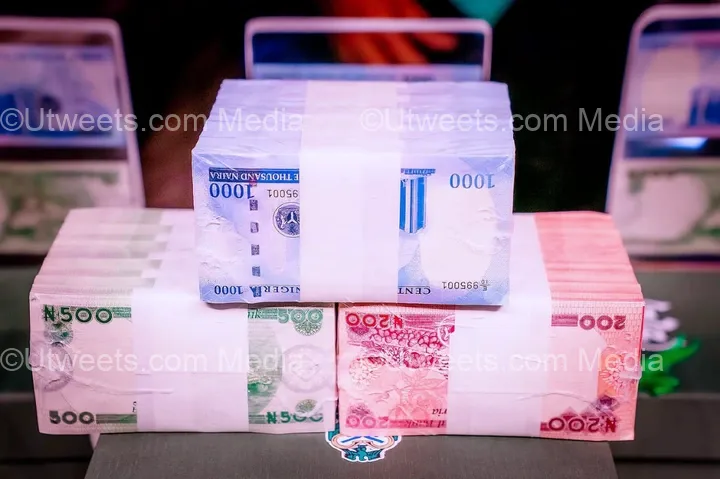TRENDING NOW| NEW METHOD OUT NOW, CHECK OUT HOW TO KNOW IF THE GIRL YOU MEET IS AN ASHAWO IN DISGUISE | WATCH THE VIDEO NOW TO LEARN FOR YOUR SAFETY.THE Central Bank of Nigeria (CBN) has been largely silent over the cash scarcity that has hit businesses in this 2024 yuletide season, across the country. ...READ THE FULL STORY FROM SOURCE ...READ THE FULL STORY FROM SOURCE
This has prompted the Point-of-Sales (PoS) transaction operators to adjust their charges to almost 100 per cent higher.
Last year, Nigerians suffered the same fate as cash scarcity and high cost as commercial banks continue to ration cash dispensing to consumers.
Most automated teller machines (ATM) dispensing spots in Abuja Federal Capital Territory (FCT) are currently not dispensing, forcing most businesses to rely on PoS merchants for their transactions.
Already, transaction charges are going up, as most PoS operators devise means of ‘buying’ money at higher costs (charges) to transact with customers.
“It’s difficult for us to get cash now. Banks ration it to us. Even those of us licensed PoS operators don’t get more than N10,000 a day,” a PoS operator in Kubwa, Nneka Oparaku told The ICIR.
Following the rising cost of transactions, retails stores and filling stations outlets are arbitrarily adding charges to their customers .
Economic watchers say, this development and additional charges for transactions could worsen inflation which is already at 33.88 per cent, according to October figures.
“This is sad and I expect the CBN to take appropriate actions on this. Why should people be spending naira to buy naira with the current rate of inflation,” a development economics, Celestine Okeke told The ICIR.
Checks in some parts of the country showed difficulties encountered by many Nigerians to access cash from the ATM.
Unfortunately, PoS operators are currently taking advantage of the situation to demand exorbitant transaction charges which some economic watchers say is pressuring up inflation on citizens.
A mechanic based in Kubwa – a satellite town at the Federal Capital Territory (FCT), Emeka Ojiaku, described the situation as terrible and tortuous and urged banks to make cash available.
“This is really difficult for us in small businesses. We can’t even save in the bank again. We’ll be feeding from hand to louth,” he said.
At Providus Bank at Nitel Junction in Central Business District, some customers on the queue told the ICIR that with the current situation, it’s better to not to be keeping money in the bank’s anymore.
Bank Customers queue for cash at at Providus Bank in Central Business District,Abuja.
“Why should I have to keep my money in the bank and suffer to get it back. It’s a very serious problem. I have learnt my bitter lessons and not all my money will be in the bank again,” a bank customer, Gloria Ajala, told The ICIR.
What PoS officials are saying on the situation
The National vice president of the Association of Mobile Money and Bank Agents of Nigeria (AMMBAN), Obiora Oti, said the CBN must not make cash policies in isolation with the PoS licensed operators.
He said, “CBN must give quota to the Mobile money operators in their cash disbursement policy. They should out us in the equations. We are at the mercy people and the government in most cases who blame us for every misnomer in cash business,” he said.
He noted that the association has met with the Chairman House Committee on Banks and Auxiliary institutions, Eze Nwachukwu, to find a last solution to the problem.
Commenting in a similar vein, an official of licensed PoS operator in Edo State, Juliet Madike, said additional electronic levy charge of N50 for transaction above N10,000 constitutes what triggered the higher transaction costs.TRENDING NOW| NEW METHOD OUT NOW, CHECK OUT HOW TO KNOW IF THE GIRL YOU MEET IS AN ASHAWO IN DISGUISE | WATCH THE VIDEO NOW TO LEARN FOR YOUR SAFETY.
According to Juliet, operational costs for PoS business and arbitrary charges by local governments and municipal authorities also affects higher charges on customers.
“There’re so many costs attached to an average PoS operators. The recent one is the electronic levy, taxes and business space. The charges are not entirely our fault,” she said.
The ICIR reports that buying naira, suffocates business with most businesses struggling with higher bank interest rates and inflation.
The ICIR sent messages to the head corporate of communications at the CBN, Sidi Hakama, but got no response.
In Lagos, Ogun state banks limit ATM dispensers to N5,000
Many of the Nigerian banks visited in Ogun State have configured their automated teller machines (ATMs) to dispense a maximum of N5,000 when using other ATM cards on their machine.
The reporter visited Guaranty Trust Bank (GTB) at the Redemption City in Mowe and observed that the bank’s ATM could only dispense N5,000 to customers using the ATM card from other banks.
A PoS merchant at his business outlet in Kubwa-FCT
This withdrawal can only be done once as further attempts to withdraw with other banks’ ATMs were unsuccessful meaning the bank could be restricted to withdraw more than once using other banks’ ATM cards.
With the GTB cards, customers could withdraw N10,000 at once and also have access to subsequent withdrawals but the limit the machine can give was N10,000.
The reporter also visited other banks like FCMB, Ecobank Zenith Bank and Access Bank.
He observed that at Access Bank customers were also limited to N5,000 withdrawals using other banks’ ATM cards but they could have access to withdraw more than once.
The limit of N5,000 withdrawal placed on banks’ ATMs indicates that the banks could be faced with scarcity of cash which has become a norm during the Christmas season.
PoS operators raise charges
PoS operators have started to increase the amount they charge their services to customers who either want to make a withdrawal, deposit money or transfer money on behalf of a customer to a recipient.
A PoS operation, who gave her name as Esther told the reporter that she has started charging N150 for a N5,000 cash withdrawal but that others are charging N200 with her location at Opic Road, Loburo, Mowe.
She said she has been sourcing the bulk of the cash she used to transact business daily from market traders and filling station attendants.
“We pay to get the cash from market women and people that are selling something. We also go to filling stations to look for cash to use for our business. If customers come and you say you don’t have cash they will think that you are not serious.
“So, we have to go to them and buy the money from them. If they give us N10,000, we pay them N100 and if it is N20,000 they collect N200. That is why I am charging 150 to make back my money,” Esther said.
Esther said she would have been collecting N100 for every N5,000 withdrawal but that the Opay account she used has started to remove some fees for her account.
The ICIR can report that the fintech companies – Opay, PalmPay, MoniePoint and other mobile money operating companies – have begun a deduction of N50 Electronic Money Transfer Levy (EMTL) from customer inflows of N10,000 and above since September 9, 2024.TRENDING NOW| NEW METHOD OUT NOW, CHECK OUT HOW TO KNOW IF THE GIRL YOU MEET IS AN ASHAWO IN DISGUISE | WATCH THE VIDEO NOW TO LEARN FOR YOUR SAFETY.
“If Opay removes N50 from my account, I have to add it to the charge that the customer will pay me,” Esther added.
Another PoS operator, Idayat, corroborated that PoS operators are sourcing cash from traders and the filling stations.
But she claimed she had not started charging more than N100 for an N5,000 withdrawal from customers.
According to her, she has a rapport with some bank staff who help her to get cash from the bank but refused to name any bank.
“The ATM is only giving us N10,000. I go to the bank and people help me to get more cash but I pay them something.”
According to Idayat, she could get as high as N200,000 cash from the bank and tip the staff N1,000 or more.
The apex bank had recently said it would sanction banks failing to dispense cash through their ATMs, as part of efforts to ensure sufficient cash in circulation.
The CBN Governor, Yemi Cardoso, made this declaration at the end of the 297th Monetary Policy Committee (MPC) meeting in Abuja in November, directing banks to ensure there is always enough cash available for withdrawals.
“We have devised a monitoring system, a spot-checking system, whereby we will go to the banks and just ensure that these things are done in the way and manner in which they are meant to be done.
“And if they are not, again, there will be sanctions but I believe that at the stage we are in now, everybody realises that stakeholders play their part in ensuring that cash gets to the desired places they are intended to be,” Cardoso warned.TRENDING NOW| NEW METHOD OUT NOW, CHECK OUT HOW TO KNOW IF THE GIRL YOU MEET IS AN ASHAWO IN DISGUISE | WATCH THE VIDEO NOW TO LEARN FOR YOUR SAFETY.
Harrison Edeh is a journalist with the International Centre for Investigative Reporting, always determined to drive advocacy for good governance through holding public officials and businesses accountable.…Read -T.he.Full_Article.Here.



